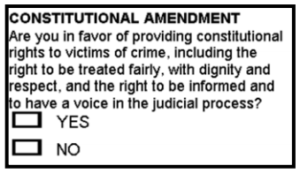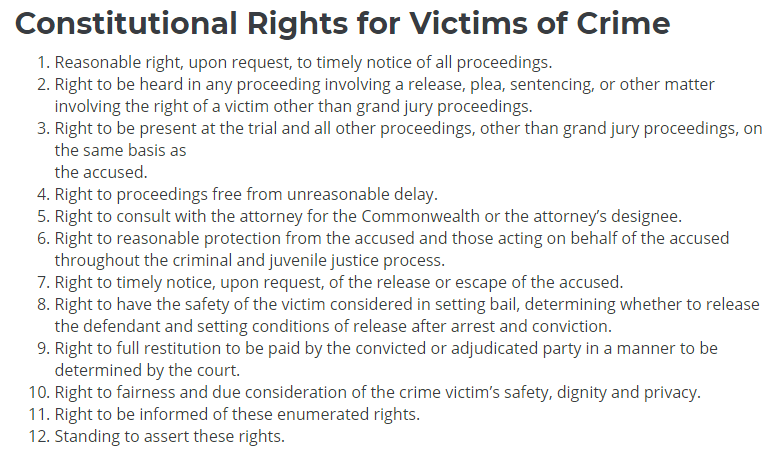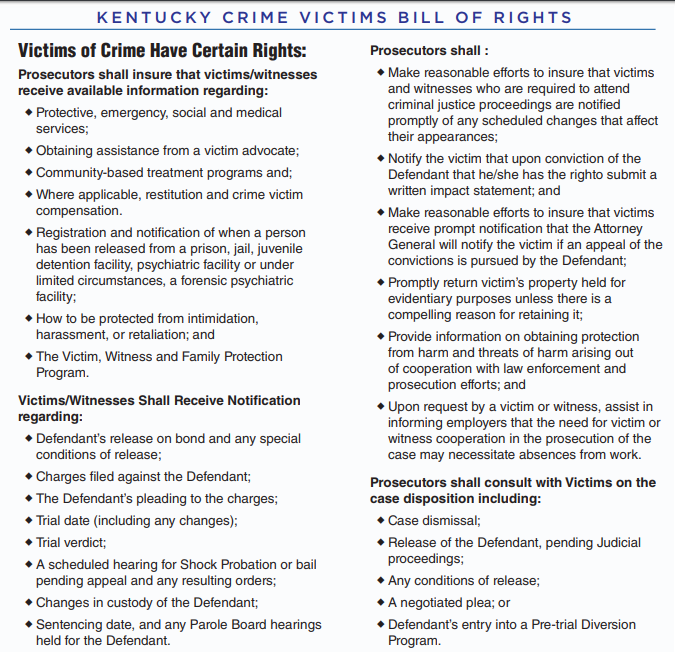Marsy’s Law (KY) Analysis – PART 2 The Current State of Crime Victims’ Rights
 Earlier this year, the Kentucky General Assembly voted to pass the “Marsy’s Law” measure, which seeks to create a new section of the Kentucky Constitution and provide an array of rights for victims of crime. Because this measure will amend Kentucky’s Constitution—a significant feat not to be taken lightly—it must be ratified by voters in the 2018 general election. While the provision was recently struck down as “unconstitutionally vague” by the Franklin Circuit Court, the provision will remain on the ballot pending appeal. Thus, Kentucky voters will be shown the following when they head to the polls:
Earlier this year, the Kentucky General Assembly voted to pass the “Marsy’s Law” measure, which seeks to create a new section of the Kentucky Constitution and provide an array of rights for victims of crime. Because this measure will amend Kentucky’s Constitution—a significant feat not to be taken lightly—it must be ratified by voters in the 2018 general election. While the provision was recently struck down as “unconstitutionally vague” by the Franklin Circuit Court, the provision will remain on the ballot pending appeal. Thus, Kentucky voters will be shown the following when they head to the polls:
While few can argue with the intent of a bill that promotes the rights of crime victims, “Marsy’s Law” could have some unintended effects which will dramatically change the face of our criminal justice system. For more information on how Marsy’s Law will blur the lines between civil and criminal law, check out Part I of this analysis found here (https://adamsattorneys.com/2018/01/17/marsys-law-ky-analysis-part-i-blurring-the-lines-between-civil-and-criminal-law/)
At least until the end of the 2018 year, pending the outcome of both the Marsy’s Law vote and the appeal of the Franklin Circuit Court’s decision, Kentucky’s Crime Victim Bill of Rights is codified in KRS § 421.500 to 421.575. The purpose of this Act is “to establish the minimum conduct of criminal justice professionals with respect to crime victims and to communicate the intent of the General Assembly that victims of crime play an integral role in the criminal justice process.” KRS 421.573(1).
Does this sound familiar? It should, because it’s almost identical to the objective of Marsy’s Law. The only difference that this proposed constitutional amendment provides is the right of standing for a victim to essentially commandeer a prosecution if he or she so chooses.
Let’s take a look at a simplified comparison of what Marsy’s Law aims to provide and what Kentucky’s current Crime Victim’s Bill of Rights provides:
Marsy’s Law[1]
Kentucky Crime Victim’s Bill of Rights[2]
To review the Kentucky Attorney General’s full Crime Victims’ Bill of Rights Handbook, visit: https://ag.ky.gov/publications/AG%20Publications/Crime-Victim-BoR-Handbook.pdf
Under the current Kentucky Crime Victims Bill of Rights, victims already have the right to timely notification for all proceedings, as well as a defendant’s release, parole eligibility, and/or escape. Victims already have the right to be present at all proceedings. Victims also already have the right to consult with the prosecutor’s office. Victims already have the right to reasonable protection from the accused. Victim’s already have the right to have their safety considered when bail is set. Victims already have the right to restitution if the court finds they are owed any. And each of these rights is already codified into Kentucky Law, KRS § 421.500 to 421.575.
The only new rights that Marsy’s Law provides are as follows: the constitutional right to be heard at every proceeding, and the standing[3] to assert these rights. If this doesn’t sound like a major issue, please refer back to Part I of this analysis.
The point is, victims should have—and already do have— the right to be heard. They should not, however, be able to act as their own pseudo-prosecutor. This not only undermines the entire purpose of the criminal justice system, but is entirely inefficient. For the system to function properly, it must remain an adversarial system of prosecution versus defendant. Adding a third party into the mix is simply not feasible.
Someone once said, “don’t reinvent the wheel, just realign it.” And maybe that is what the efforts of Marsy’s Law should focus on instead of completely upending the system in place.
If victims are not receiving the rights to which they are statutorily entitled, that is an implementation issue which must be resolved. It does not, however, serve as the basis for a constitutional amendment. The Office of the Attorney General already provides numerous resources for Commonwealth’s and County Attorneys to use in helping victims navigate the criminal justice system. Yes, there are probably discrepancies in victims’ advocacy from county to county. But this doesn’t mean that the Kentucky Crime Victims Bill of Rights is insufficient; it just means there must be reform to ensure the laws are properly implemented. Marsy’s Law is more than reform. It is fundamental and seismic change to the Anglo-American system of criminal justice—one that would be bad for Kentucky and for all its citizens.
[1] Screen shot from the Marsy’s Law for Kentucky website, found at: https://www.victimsrightsky.com/about_marsys_law_for_kentucky
[2] Screen shot from Kentucky Attorney General’s Office of Victims Advocacy brochure on Victims’ Rights, found at: https://ag.ky.gov/publications/AG%20Publications/Victims-Rights-brochure.pdf
[3] Standing is the right to not simply be present in Court, but the right to actively have an attorney litigate a matter on your behalf due to your rights being affected.



